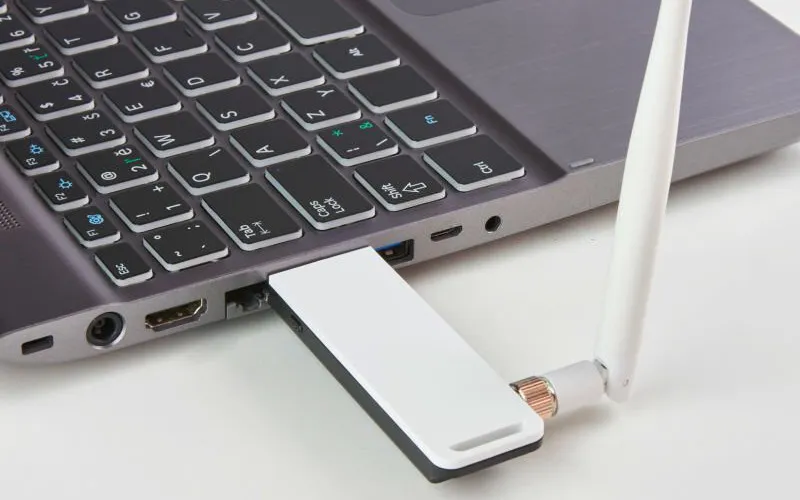Are you looking for a Wi-Fi adapter to improve your internet connection? You might have come across two main types: PCIe and USB. But which one should you choose?
As someone who has researched this topic extensively, I can tell you that each type has advantages and disadvantages. In this article, I’ll walk you through the differences between PCIe and USB Wi-Fi adapters so you can decide based on your needs and preferences.
Let’s get started!
What is a PCIe Wi-Fi Adapter?
First up, let’s talk about PCI-e Wi-Fi adapters. These adapters are installed directly into a PCI-e slot on your motherboard. This means they have a direct connection to your computer’s processor and memory, resulting in faster speeds and more stable connections than USB adapters.
One of the great things about PCI-e Wi-Fi adapters is that they come in various form factors and can support different Wi-Fi standards like 802.11ac or 802.11ax. This means you can choose an adapter that fits your computer’s needs.
Another advantage of PCI-e Wi-Fi adapters is that they often come with multiple antennas that can improve signal strength and range. Plus, since they’re internal components, you don’t have to worry about losing or damaging them like you might with a USB adapter.
However, PCI-e Wi-Fi adapters do have some downsides. They can be more difficult to install than USB adapters and are less portable. Plus, they may not be compatible with all computers, so check your computer’s specs before purchasing a PCI-e adapter.
If you’re looking for a Wi-Fi adapter that prioritizes speed and stability over portability, a PCI-e adapter might be the way to go.
What is a USB Wi-Fi Adapter?
You got it! Here’s the section on USB Wi-Fi Adapters written in a more conversational style:
Now, let’s talk about USB Wi-Fi adapters. These adapters are connected to your computer’s USB port, making them highly portable and easy to use. They’re a great choice if you need to quickly add Wi-Fi capabilities to a computer that doesn’t have a built-in Wi-Fi card.
One of the biggest advantages of USB Wi-Fi adapters is their convenience. You can easily swap them between computers or take them on the go. They are also more affordable than PCIe adapters, so they’re a good option if you’re on a budget.
USB Wi-Fi adapters can also come in handy if your computer has limited space for internal components or you don’t want to open up your computer to install a PCIe adapter.
That being said, USB Wi-Fi adapters do have some drawbacks. Since they’re external components, they’re more prone to interference from other devices and can sometimes be less stable than PCIe adapters. Depending on the specific adapter you choose, they may also be limited in speed and range.
If you value portability and convenience over speed and stability, a USB Wi-Fi adapter might be your better option. Just make sure to choose a high-quality adapter that can provide a reliable connection.
Comparison of PCIe vs USB Wi-Fi Adapters
Now that we’ve covered the pros and cons of each type of adapter let’s compare PCIe and USB Wi-Fi adapters side by side.
Regarding speed and stability, PCIe adapters are generally the superior option. Since they have a direct connection to your computer’s processor and memory, they can provide faster speeds and more stable connections than USB adapters. Additionally, PCIe adapters often come with multiple antennas that can improve signal strength and range.
On the other hand, USB adapters are much more convenient and portable. They’re a great choice if you need to add Wi-Fi capabilities to a computer quickly or frequently switch between devices. Plus, they tend to be more affordable than PCIe adapters, making them a good option if you’re on a budget.
The choice between PCIe and USB adapters depends on your needs and preferences. If you’re a gamer or streamer needing the fastest and most stable connection possible, a PCIe adapter might be your best choice. But a USB adapter might be more convenient if you’re a student or professional who needs to connect to Wi-Fi on the go.
It’s also worth noting that many high-quality options are available for both types of adapters, so do your research and choose a reputable brand with good reviews.
PCIe and USB Wi-Fi adapters have unique advantages and disadvantages, so the choice comes down to what’s most important to you.
Conclusion
When choosing between a PCIe or USB Wi-Fi adapter, there are several factors to consider. PCIe adapters generally offer faster speeds and more stable connections, while USB adapters are more convenient and portable.
Ultimately, the choice depends on your individual needs and preferences. A PCIe adapter may be the way to go if you value speed and stability above all else. But a USB adapter might be the better option if you need something portable and affordable.
No matter which type of adapter you choose, make sure to do your research and choose a reputable brand with good reviews. With a high-quality Wi-Fi adapter, you can improve your internet connection and enjoy faster, more reliable speeds.






